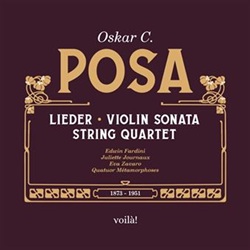Das junge französische Label Voilà Records veröffentlicht Ersteinspielungen eines kaum bekannten Österreichers, Oskar C. Posa (1873-1951).
Posa studierte zunächst Rechtswissenschaften, wandte sich aber dann ganz der Musik zu. Er fand vor allem Beachtung als Liederkomponist. Biographische Übersichten zu Posa bestätigen seine enge Verbindung zu Schönberg und seinem Umfeld. Er war Mitglied des 1918 von Schönberg gegründeten Vereins für musikalische Privataufführungen und 14 Jahre zuvor Mitbegründer und Generalsekretär der Vereinigung schaffender Tonkünstler und verfasste deren Gründungsmemorandum (das lange Zeit fälschlicherweise Schönberg zugeschrieben wurde).
Er hatte mehrere Stellen als Musikmanager, hegte zeitlebens große Zweifel am Wert seiner Musik und wurde als gebürtiger Jude, der sich 1897 taufen ließ, von Nazischergen verfolgt und seines Amtes enthoben, blieb aber sonst verschont. Seine Kompositionen erschienen aber quasi unter Ausschluss der Öffentlichkeit und es bedurfte weitreichender Arbeiten in Archiven, um das Programm dieses Albums auszugraben.
Das Programm beginnt mit einem romantisch-lyrischen Albumblatt. Darauf folgt die 1901 entstanden Violinsonate, deren erster Satz sofort gefangen nimmt.
Die beiden Interpreten, die Geigerin Eva Zavaro und Juliette Journaux am Klavier, gehen die Sonate engagiert an und werden der Satzanweisung ‘molto passionato’ bestens gerecht. Sie schaffen es, den langen Atem, den der fast zehnminütige Satz fordert, durchzuhalten und dessen verzehrende Erregung zum Ausdruck zu bringen. Darauf folgt ein nicht weniger expressives Andante maestoso, das einem alerten Allegro molto vorausgeht, dessen tänzerisch-drängende Musik mit ihren lyrischen Einlagen wunderbar zum Ausdruck kommt. Am Ende kann man nur staunen, dass dieses hochkarätige Werk bisher unbekannt war.
Ein lyrisches, nachdenkliches Andante für Cello und Klavier führt zum Streichquartett, dessen erster Satz sehr charakteristisch ist und den Hörer sofort fesselt. Hier überzeugt das leidenschaftlich engagierte Spiel des Quatuor Métamorphoses. Große Bögen und feine Details fügen sich zu einem geschlossenen Ganzen.
Eine charmante Canzonetta führt zum verspielten Intermezzo giocoso, ehe uns die Fuga capriciosa wieder total erstaunt: diese ist so einfallsreich und so gut komponiert, dass man aus dem Staunen nicht heraus kommt. Das Quatuor Métamorphoses bietet einmal mehr seine ganz Kunst auf, um diese Komposition zu maximaler Wirkungskraft zu bringen.
Das zweite Programm ist ganz Posas Liedschaffen gewidmet und wird vom aus Martinique stammenden französischen Bariton Edwin Fardini gesungen. Von den 80 Liedern, die Posa komponiert hat, haben Fardini und die Pianistin Juliette Journeaux deren 24 ausgewählt. Diese sehr charakteristischen Lieder, die jenen eines Hugo Wolf oder Richard Strauss’ in nichts nachstehen, verlangen vom Interpreten nicht nur ungemein viel Intelligenz, sondern auch die Fähigkeit, Musik und Texte tief genug auszuloten. Fardini bringt dafür die besten Voraussetzungen mit. Er hat eine Stimme, nach der man ihn älter einschätzen würde als er tatsächlich ist. Das gibt seinen Interpretationen eine ungewöhnliche Tiefe und Reife. Stimmführung und Färbung sind hervorragend.
The young French label Voilà Records is releasing the first recording of a little-known Austrian, Oskar C. Posa (1873-1951).
Posa initially studied law, but then turned his attention entirely to music. He was primarily recognized as a composer of songs. Biographical data confirm Posa’s close connection to Schönberg and his circle. He was a member of the Association for Private Musical Performances, founded by Schönberg in 1918, and 14 years earlier was co-founder and general secretary of the Association of Creative Musicians and wrote its founding memorandum (which for a long time was wrongly attributed to Schönberg).
He held several positions as a music manager, harbored great doubts about the value of his music throughout his life and, as a Jew by birth who was baptized in 1897, was persecuted and removed from office by Nazi henchmen, but was otherwise spared. However, his compositions were published virtually in camera and it took extensive work in archives to unearth the program for this album.
The program begins with a romantic-lyrical album sheet. This is followed by the Violin Sonata, composed in 1901, whose first movement is immediately captivating.
The two performers, violinist Eva Zavaro and Juliette Journaux at the piano, tackle the sonata with commitment, doing full justice to the movement instruction ‘molto passionato’. They sustain the long breath demanded by the almost ten-minute movement expressing its consuming excitement. This is followed by an equally expressive Andante maestoso, which precedes an alert Allegro molto, whose dance-like, urgent music is wonderfully expressed with its lyrical interludes. In the end, one can only marvel that this top-class work was previously unknown.
A lyrical, thoughtful Andante for cello and piano leads to the string quartet, the first movement of which is very characteristic and immediately captivates the listener. The passionately committed playing of the Quatuor Métamorphoses is convincing here. Large arches and fine details come together to form a cohesive whole.
A charming Canzonetta leads to the playful Intermezzo giocoso, before the Fuga capriciosa again completely astonishes us: it is so imaginative and so well composed that you can’t help but be amazed. The Quatuor Métamorphoses once again offers all its artistry to bring this composition to maximum effect.
The second program is entirely dedicated to Posa’s songs which are performed by the French baritone Edwin Fardini from Martinique. Of the 80 songs composed by Posa, Fardini and pianist Juliette Journeaux have selected 24. These highly distinctive songs, which are in no way inferior to those of Hugo Wolf or Richard Strauss, require the interpreter to have immense intelligence and the ability to delve deeply into the music and texts. Fardini has all the necessary prerequisites. His voice makes you think he is older than he actually is. This lends his interpretations unusual depth and maturity. His voice leading and coloring are outstanding.


















